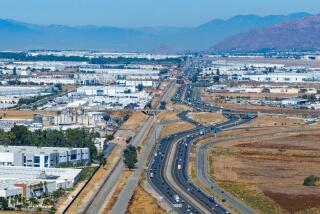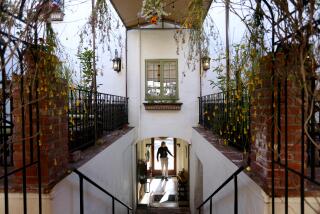Twice-Uprooted Family Stands Firm This Time on Renewal Plan
- Share via
The Muratas know what it’s like to be forced off their land.
They were forced to temporarily abandon their land in Downey in 1942, when they moved to Utah to avoid internment after the Japanese attacked Pearl Harbor in World War II. Then they were forced to give up their home and 55 acres in Downey in the early 1960s to make way for the San Gabriel River Freeway.
Now the family fears that it’s about to happen again.
Downey officials are planning to establish a 37.4-acre redevelopment zone south of the intersection of the Santa Ana and San Gabriel River freeways. The Muratas own 17 acres of prime land in the proposed redevelopment area, which Downey officials envision as the site for a thriving auto mall.
Downey officials would like to have the power of eminent domain to seize the property, if necessary, for their redevelopment plan. State law allows a redevelopment agency to take private property as long as it pays the owner a fair market price.
But the Muratas hired an attorney and have vowed to take the city to court if their land is included in the redevelopment zone.
About 15 of the Muratas’ 17 acres have been leased to an auto dealership and a PACE discount store. The Muratas occupy the rest of the land. The old family house, a barn, and a small building where the family sold strawberries until 1989 are on that portion of the land. The house is used as an office.
The Muratas say they don’t know exactly what they want to do with their property. But they do know that they don’t want Downey redevelopment officials making their decision for them.
The Muratas also fear they would have to settle for less than what the land is worth if the city were to seize their property through eminent domain.
“We own the property. We want to be able to do with the property what we want to do. That’s the bottom line,” said Florence Chew, 38, whose late grandfather, Daisaku Murata, first bought land in the Downey area in the 1920s.
The City Council approved two new redevelopment zones earlier this month but postponed a vote on the zone that would include the Murata property.
City officials plan to meet with the Muratas to settle the dispute, but no date has been set.
Ken Farfsing, assistant city manager for economic development, said Downey stands to gain tens of thousands of dollars a year in sales tax revenue if the proposed zone is developed into an auto mall or if other large stores are built on the site. The city could use that money to pay for additional police and other city services, Farfsing said.
“We would like to resolve this without a lawsuit,” Farfsing said. “We want to listen to what they have to say.”
The city already has dropped about 1.5 acres from the proposed redevelopment zone to avoid problems with other property owners. But the Murata property is key, accounting for nearly half of the zone.
Ironically, the Muratas obtained the 17 acres in exchange for the 55 acres the state seized to clear a path for the San Gabriel River Freeway.
Daisakuq Murata, who had been a farmer in Iwakuni, Japan, immigrated to the United States in 1902 and worked as a laborer and a cook. He and his wife, Fui, had six children.
The Muratas began farming their Downey land around 1940. In December, 1941, the Japanese attacked Pearl Harbor and the U.S. government issued its ultimatum to Japanese immigrants and their families: They could move from the West Coast or be interned in camps.
The Murata family, which lived in Gardena at the time, left their home and Downey land and moved to Utah.
“We had to drop everything here,” said Daisaku Murata’s son Takeo, 72.
After the war, the Muratas paid back taxes to retain their holdings. They resumed farming in Downey in 1948 and set up residence on the property in 1950.
Daisaku Murata and his two sons made a decent living growing potatoes and yams, celery, carrots, rhubarb and onions. Strawberries became the family’s main crop in the late 1950s.
The Muratas tangled with the government again in the mid-’50s, when the state began acquiring property to build the San Gabriel River Freeway. The state condemned and wanted to buy the Muratas’ land, but the family refused to sell.
A three-year court battle ended when the state swapped 17 acres of land in Downey for the 55 acres over which the freeway now passes, the Muratas said. The Muratas felt they were being shortchanged but settled anyway.
“We were in court for three years,” said Takeo Murata. “We didn’t want the money. My idea was living in Downey and still farming.”
But the Muratas soon found that it was more lucrative to lease the Downey land. They stopped farming the last portion in the mid-1970s.
The Muratas now lease nearly 10 of their 17 acres to the PACE store and about five acres to the Penske Honda and Cadillac auto dealerships.
James Murata, 41, of La Habra, a grandson of the patriarch, said he was the last family member to live in the old house, which sits on a little less than two acres. There are tractors and other old farm equipment on the property. James Murata said he moved out last October.
James Murata and his brother Henry, 49, of Mission Viejo, still farm strawberries on leased land near El Monte.
Farfsing, the assistant city manager, said he considers the family-used portion of the Murata property to be run-down and a prime candidate for redevelopment. In all, he said, the 17 acres could be used for sizable commercial developments.
The Muratas’ most immediate fear is that the redevelopment agency will condemn their property and sell it to auto dealer Roger Penske to allow him to expand his dealerships.
Penske’s lease on the Murata property is due to expire in March, 1995, the Muratas said. The auto dealer had sought to renew his lease and to lease the land occupied by the Muratas. But negotiations broke down in 1987 after the two sides failed to agree on rates, James Murata said.
The Muratas’ lawyer, Christopher A. Sutton, has accused the city of conspiring with Penske to obtain the land. He said the city failed to properly inform the family of the city’s redevelopment plans. Sutton also accused the city of purposely failing to give the Muratas a chance to sit on a citizens committee that is charged with reviewing the plans. The committee could force the council to approve the plans by a four-fifths vote instead of a simple majority.
“It is clear that the city and Penske have been involved in an illicit deal,” Sutton wrote in a recent letter to the City Council.
Farfsing said “postal mix-ups” kept some information from reaching the Muratas. He also acknowledged that city officials fear that Penske could be lured away from Downey by neighboring cities. Penske’s dealerships are the city’s second-largest source of sales tax revenue, he said.
But Farfsing denied conspiring with Penske to take the Murata property.
“No promises were made to anyone, no deals,” Farfsing said. “There’s really nothing between the city and Penske.”
Penske was unavailable for comment, a secretary at the Downey office said.
The family apparently has at least one City Council ally. Councilman Robert G. Cormack said in an interview that he would not vote to seize the Muratas’ property through eminent domain if the redevelopment zone is approved as proposed. Cormack said he was a friend of the late Kenji Murata, the patriarch’s eldest son and Takeo Murata’s brother.
The councilman said that if the redevelopment area were established, the city could help the Murata family to build what it wants on its property. And if the Muratas were to decide to sell, they would enjoy certain tax advantages allowed under redevelopment law, Cormack noted.
Cormack said he promised Kenji Murata before his death that he would protect the family land holdings in Downey from harmful governmental action.
“I said, ‘As long as I’m living, I’ll do the darndest to make sure that doesn’t happen,’ ” Cormack said.
But the Muratas say they are not willing to take any chances; they simply don’t want their property in the redevelopment zone.
James Murata said the family has been selling the old farm equipment and plans to tear down the old barn to spruce up the property. Painters worked last week on the old family house, where Daisaku Murata and his son Kenji were living at the time of their deaths.
“We fought for this land, and we don’t want to get moved out,” Florence Chew said.
More to Read
Sign up for Essential California
The most important California stories and recommendations in your inbox every morning.
You may occasionally receive promotional content from the Los Angeles Times.













